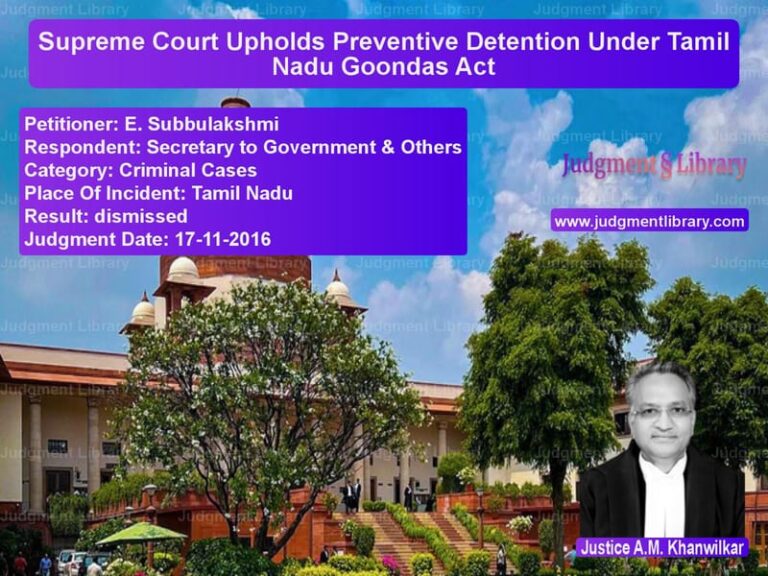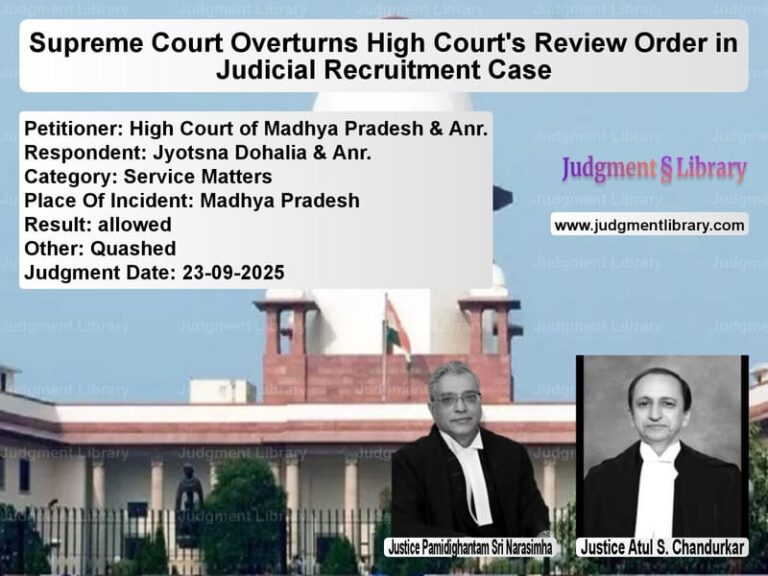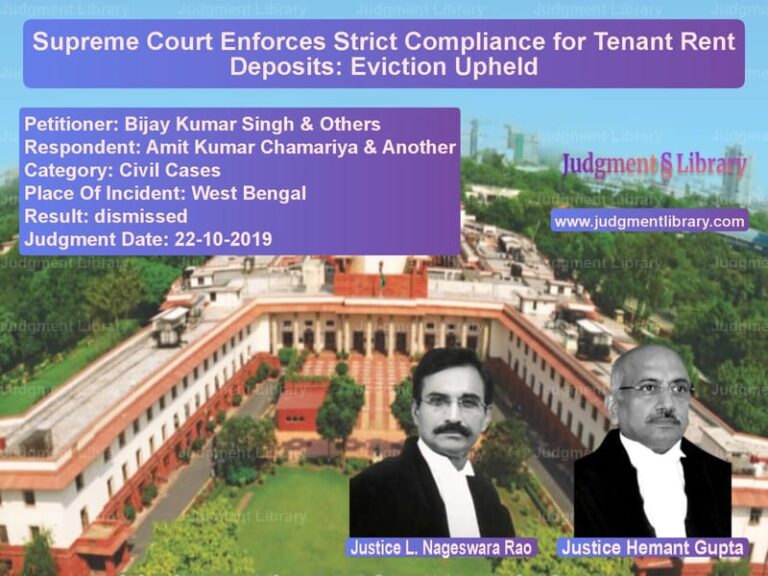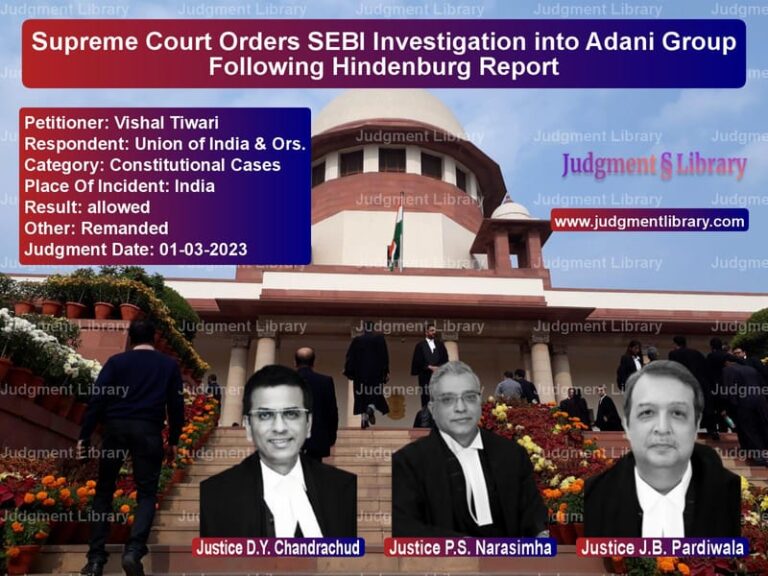Arbitration Dispute Between Arif Azim Co. Ltd. and Aptech Ltd.: Supreme Court Rules on Limitation Period
The Supreme Court of India recently delivered a landmark judgment in the case of M/S Arif Azim Co. Ltd. vs. M/S Aptech Ltd., addressing crucial issues related to arbitration proceedings and limitation under the Arbitration and Conciliation Act, 1996. The ruling clarifies the applicability of the Limitation Act, 1963, in arbitration matters and provides guidance on when the limitation period for filing an arbitration petition begins.
Background of the Case
The dispute originated from three franchise agreements signed on March 21, 2013, between Arif Azim Co. Ltd. (a Kabul-based company) and Aptech Ltd. (an Indian company). These agreements covered the following franchise businesses:
- Aptech English Language Academy (AELA)
- Aptech Computer Education (ACE)
- Aptech Hardware and Networking Academy (AHNA)
The primary dispute in this case pertained to the agreement for Aptech English Language Academy (AELA). Under the agreement, the petitioner was required to pay a non-refundable fee of USD 30,000 and recurring royalty payments ranging from 10% to 17.5% of the gross collections.
Dispute Over ICCR Payment
In 2016, the Indian Council for Cultural Relations (ICCR) issued a sanction order approving Aptech Ltd. to conduct an English language training course for Afghan students. The program was executed by Arif Azim Co. Ltd. from February to April 2017 for 440 students, under the franchise agreement.
However, issues arose when ICCR allegedly made a partial payment to Aptech Ltd., which the petitioner claimed should have been shared with them. The petitioner demanded 90% of the received amount, citing the franchise agreement.
Key Legal Issues
- Whether the arbitration petition was barred by limitation.
- Whether the franchise agreement’s arbitration clause applied to the ICCR payment dispute.
- Whether the petitioner had the right to invoke arbitration under Section 11(6) of the Arbitration and Conciliation Act.
Arguments by the Petitioner
The petitioner’s counsel contended that:
- The dispute falls under the franchise agreement, making arbitration applicable.
- The right to seek arbitration arose only when Aptech Ltd. failed to disclose the received amount.
- Due to the Taliban’s resurgence in 2021 and COVID-19, legal proceedings were delayed, which should be considered for limitation purposes.
- The petitioner attempted pre-litigation mediation under Section 12A of the Commercial Courts Act, which should not prevent arbitration.
Arguments by the Respondent
Aptech Ltd. countered that:
- The dispute regarding ICCR payments was outside the scope of the franchise agreement.
- The petition was barred by limitation, as the dispute arose in 2017.
- The petitioner’s mediation attempt before the Bombay High Court was under a different legal framework and could not be linked to arbitration.
Supreme Court’s Observations and Judgment
1. Applicability of the Limitation Act to Arbitration
The Court reiterated that the Limitation Act, 1963, applies to arbitration proceedings. It cited various precedents to support that Article 137 (three-year limitation) governs arbitration petitions under Section 11(6) of the Arbitration Act.
2. When Did the Right to Apply for Arbitration Accrue?
The Court determined that the cause of action did not arise in 2017 when ICCR made the payment but rather on March 28, 2018, when Aptech Ltd. refused to disclose the full amount received.
3. Effect of COVID-19 on Limitation
The Court noted that due to the COVID-19 pandemic, the limitation period was suspended from March 15, 2020, to February 28, 2022, per its earlier ruling in SMW(C) No. 03 of 2020. Thus, the three-year limitation period, which would have ended in March 2021, was extended until March 13, 2023.
4. Was the Arbitration Petition Timely?
The petition was filed on April 19, 2023, after the extended limitation period ended in March 2023. However, the Court considered whether the pre-litigation mediation attempt in 2022 could toll the limitation period.
5. Final Ruling
The Supreme Court ruled that:
- The arbitration petition was not barred by limitation as it was filed shortly after the limitation extension ended.
- The ICCR-related dispute was sufficiently connected to the franchise agreement to justify arbitration.
- The respondent’s failure to comply with the arbitration agreement warranted judicial intervention.
The Court appointed Justice Sanjay Kishan Kaul, former Supreme Court Judge, as the sole arbitrator to resolve the dispute.
Implications of the Judgment
This ruling sets important precedents:
- Clarifies limitation in arbitration: Arbitration petitions must be filed within three years of the dispute crystallizing.
- Recognizes COVID-19 extensions: Legal deadlines were extended due to the pandemic.
- Prevents avoidance of arbitration: Parties cannot escape arbitration by refusing to acknowledge disputes.
- Affirms international arbitration: Indian courts can intervene in disputes involving foreign entities.
The judgment ensures that arbitration remains an effective dispute resolution mechanism while balancing the interests of justice.
Petitioner Name: M/S Arif Azim Co. Ltd..Respondent Name: M/S Aptech Ltd..Judgment By: Justice Dhananjaya Y. Chandrachud, Justice J.B. Pardiwala, Justice Manoj Misra.Place Of Incident: Kabul, Afghanistan.Judgment Date: 01-03-2024.
Don’t miss out on the full details! Download the complete judgment in PDF format below and gain valuable insights instantly!
Download Judgment: ms-arif-azim-co.-lt-vs-ms-aptech-ltd.-supreme-court-of-india-judgment-dated-01-03-2024.pdf
Directly Download Judgment: Directly download this Judgment
See all petitions in Arbitration Awards
See all petitions in Dispute Resolution Mechanisms
See all petitions in Commercial Arbitration
See all petitions in Institutional Arbitration
See all petitions in Enforcement of Awards
See all petitions in Judgment by Dhananjaya Y Chandrachud
See all petitions in Judgment by J.B. Pardiwala
See all petitions in Judgment by Manoj Misra
See all petitions in allowed
See all petitions in Quashed
See all petitions in supreme court of India judgments March 2024
See all petitions in 2024 judgments
See all posts in Arbitration and Alternate Dispute Resolution Category
See all allowed petitions in Arbitration and Alternate Dispute Resolution Category
See all Dismissed petitions in Arbitration and Alternate Dispute Resolution Category
See all partially allowed petitions in Arbitration and Alternate Dispute Resolution Category







